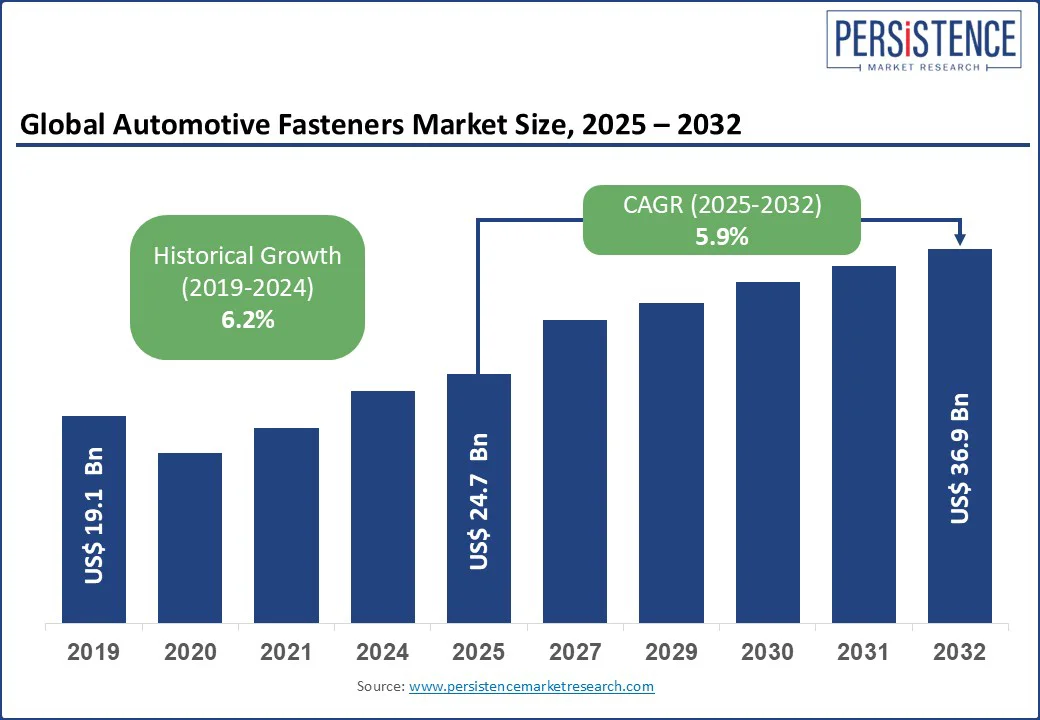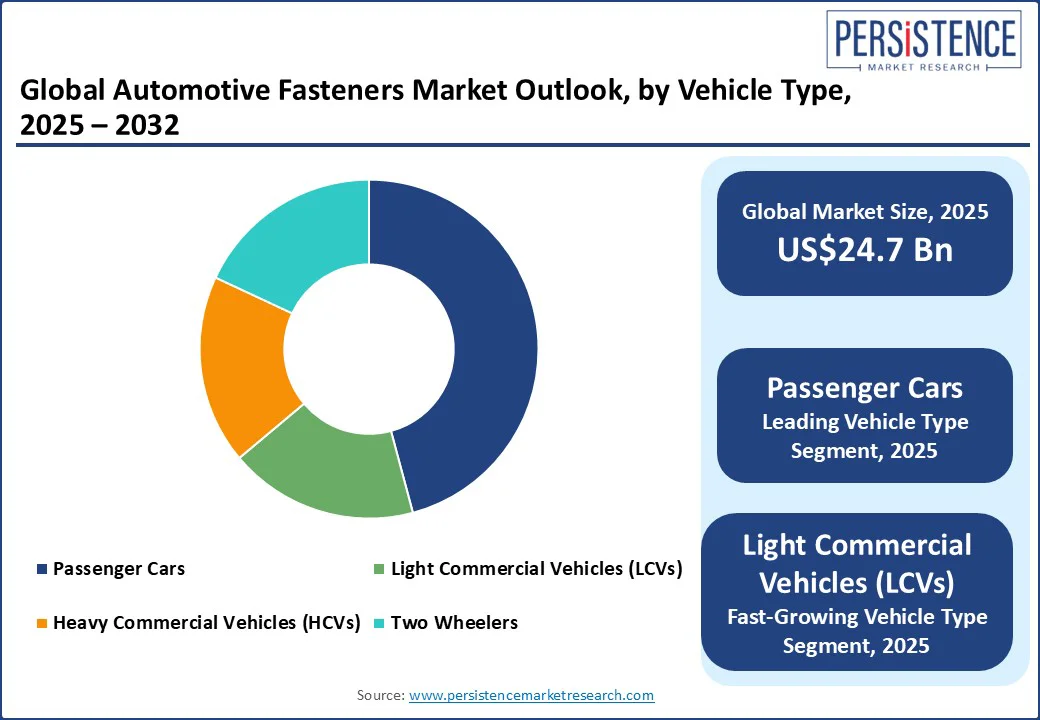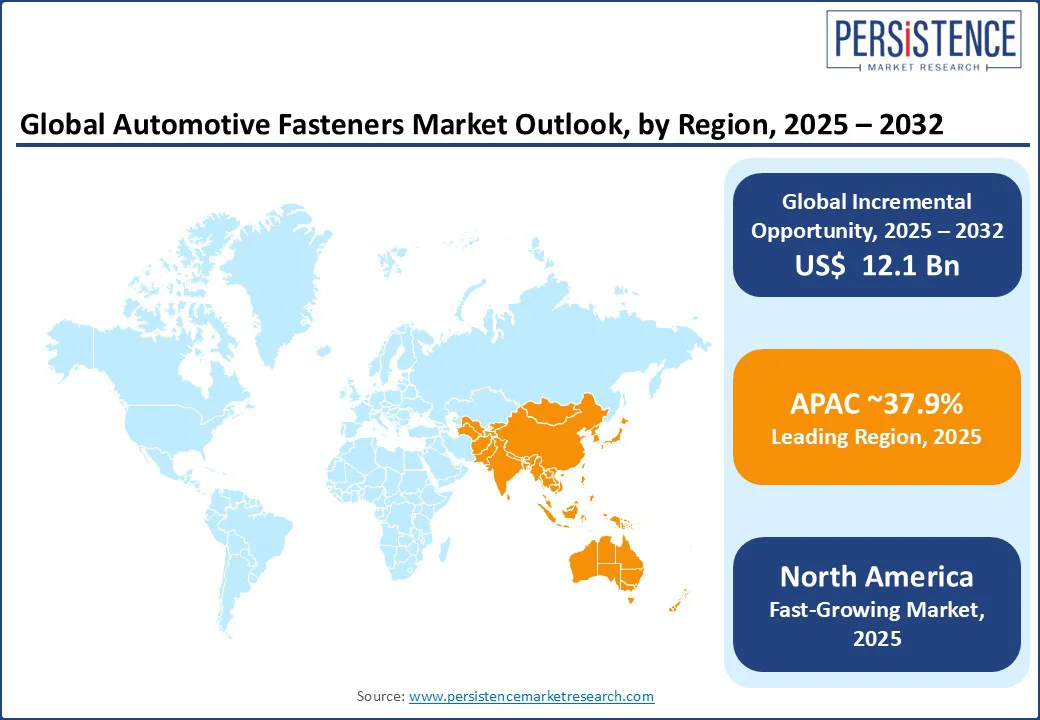ID: PMRREP35086| 198 Pages | 22 Aug 2025 | Format: PDF, Excel, PPT* | Automotive & Transportation

The global automotive fasteners market size is projected to rise from US$ 24.7 Bn in 2025 to US$ 36.9 Bn by 2032. It is anticipated to witness a CAGR of 5.9% during the forecast period from 2025 to 2032.
The automotive fasteners market has witnessed rapid growth in recent years, driven by booming global vehicle production, innovations in lightweight and corrosion-resistant materials, accelerated EV and hybrid adoption, and rising demand for precision-engineered fasteners that ensure safety, durability, and regulatory compliance.
Key Industry Highlights

|
Global Market Attribute |
Key Insights |
|
Automotive Fasteners Market Size (2025E) |
US$ 24.7 Bn |
|
Market Value Forecast (2032F) |
US$ 36.9 Bn |
|
Projected Growth (CAGR 2025 to 2032) |
5.9% |
|
Historical Market Growth (CAGR 2019 to 2024) |
6.2% |
The automotive fasteners market is witnessing robust growth, driven by the rising adoption of lightweight vehicles, high-durability fastening solutions, and increasing vehicle production post-pandemic. Government initiatives, such as the U.K. BEIS funding for Lotus Group to develop a lightweight electric vehicle (EV) architecture, are accelerating innovation in lightweight fastener technology. Automakers are prioritizing weight reduction to meet fuel efficiency mandates such as the U.S. 2025 CAFE standard, pushing manufacturers toward aluminum and plastic components.
Lightweight fasteners play a pivotal role in enhancing structural integrity across the body, chassis, powertrain, and interiors. According to OICA, global vehicle production stood at 93.4 million units in 2023 and 92.5 million units in 2024, with each passenger car requiring approximately 5,000 fasteners.
The EV boom, with over 10 million units sold in 2024 (IEA), has spurred demand for specialized EV fasteners for battery systems, thermal management, and high-voltage safety. Leading players such as Bulten AB, PennEngineering, and Stanley Engineered Fastening are innovating in aluminum, composite, and self-clinching fastener designs, ensuring corrosion resistance, material compatibility, and improved efficiency for modern automotive applications.
The automotive fasteners market faces notable challenges due to the emergence of alternative fastening technologies, such as welding, adhesives, and clinching. Adhesive fasteners are increasingly replacing traditional mechanical fasteners such as bolts, nuts, screws, and rivets due to their ability to lower material, labor, and processing costs while enhancing assembly efficiency. Furthermore, the development of specialty fasteners for structural applications in automotive manufacturing is reducing reliance on conventional fastening methods.
Rising raw material costs, notably the April 2024 surge of 12% in raw steel prices, along with ongoing supply chain disruptions, are driving OEMs toward lightweight, high-strength alternatives such as plastic fasteners and advanced composites.
Leading manufacturers, including Stanley Black & Decker and Bulten AB, are actively pursuing sourcing diversification, material innovation, and sustainable fastener solutions to address global challenges such as the Russia-Ukraine conflict and post-pandemic logistics issues.
Additionally, stringent automotive industry regulations on safety, fuel efficiency, and emissions necessitate constant redesign and material optimization, adding complexity and production costs. These market pressures are accelerating the shift toward eco-friendly, cost-efficient fastening systems, highlighting the sector’s resilience and commitment to innovation in automotive fastening solutions.
The automotive fasteners market presents a strong opportunity for manufacturers to leverage advanced manufacturing technologies such as automated production systems, smart manufacturing, and Industry 4.0 integration. These innovations enable higher efficiency, precision, and scalability, reducing production costs while enhancing quality control. Automated systems also allow faster customization of fasteners to meet the specific requirements of evolving vehicle platforms, including electric, hybrid, and autonomous vehicles.
The significant market shift toward sustainability in fastener production is driven by stringent regulatory compliance and growing consumer demand for eco-friendly products. Developing lightweight, recyclable, and corrosion-resistant fastening solutions not only aligns with global environmental standards but also appeals to environmentally conscious buyers.
By combining technological innovation with sustainable manufacturing practices, market players can differentiate their offerings, strengthen partnerships with OEMs, and secure long-term growth in an increasingly competitive automotive landscape.
In 2025, threaded fasteners are projected to dominate the automotive fasteners market, capturing 66.8% of the total revenue share, driven by their unmatched versatility and critical role in engine assembly, drivetrain systems, and structural components.
The threaded fasteners segment dominated the market, supported by rising vehicle sales and their extensive use in removable chassis, engine parts, and other critical components requiring frequent maintenance. Threaded fasteners, including screws and bolts, are widely applied in engine assembly, suspension systems, and bodybuilding because of their high tensile strength (330-1220 MPa) and yield strength (180-1080 MPa). They provide strong, adjustable, and versatile connections, though installation may be complex and costs more.
On the other hand, the non-threaded fasteners segment, comprising clips, rivets, pins, staples, and washers, is expected to grow significantly with the rising demand for lightweight vehicles. Non-threaded fasteners are quick to install, cost-effective, and commonly used in components such as car bumpers and small assemblies that require less frequent maintenance, though they lack the same clamping force and adjustability. Both fastener types remain crucial in modern vehicle design, with application and material selection driving performance efficiency.
By vehicle type, passenger cars dominate in the near future. The segment accounted for a significant share in 2023 and is projected to reach 48.3% of global market share by 2025.
According to OICA, 67.9 million passenger cars were produced in 2023 and 67.6 million in 2024, driven by rising demand, rapid urbanization, and increasing disposable incomes in emerging economies. Stricter government regulations on lightweight vehicle construction are accelerating the adoption of plastic fasteners and specialized fastening solutions to securely connect lightweight materials such as aluminum and advanced high-strength steel, improving fuel efficiency and reducing emissions.
The light commercial vehicle (LCV) segment is projected to record the fastest growth during the forecast period with a CAGR of 6.8%, driven by strong production levels of 21.4 million units in 2023 and 20.8 million in 2024. LCVs require a higher volume of fasteners compared to passenger cars due to their larger size and structural needs. Leading manufacturers, such as ZF Friedrichshafen AG and Illinois Tool Works Inc., are investing in innovative lightweight fasteners for electric, hybrid, and next-generation vehicle platforms to meet evolving environmental and design requirements.

Asia Pacific is anticipated to lead the market, driven by robust automotive manufacturing ecosystems in China, Japan, and India, which collectively account for a major share of global vehicle production.
In 2025, the region is projected to capture 37.9% share and grow at a CAGR of 5.6% through 2032, supported by rising localization strategies, sustainability initiatives, and technological advancements.
China’s automotive output, exceeding 26.8 million units in 2024, fuels substantial demand for high-performance fasteners, with industry leaders such as Zhejiang Aozhan Hardware Manufacturing spearheading innovation. Government programs such as India’s “Make in India” initiative bolster domestic automotive component production, while the surge in EV manufacturing by companies such as BYD and Tata Motors is accelerating the need for lightweight, corrosion-resistant fasteners.
Japan’s production of 8.2 million vehicles, alongside South Korea’s 4.1 million and India’s 6 million, reinforces the region’s dominance. Despite ongoing U.S.-China trade tariffs on steel and aluminum under Section 232, the Asia Pacific region remains the largest consumer and exporter of automotive fasteners, underpinned by expanding EV adoption, infrastructure growth, and increasing demand for precision-engineered fastening solutions.
North America is poised for substantial growth, projected to capture 28.3% market share in 2025 and register a 5.9% CAGR from 2025 to 2032. Stringent government regulations, such as the 2025 CAFE (Corporate Average Fuel Economy) mandate, are accelerating demand for lightweight fasteners to improve vehicle fuel efficiency.
Leading OEMs, including General Motors, Ford, and Tesla, collectively produced over 1.6 million electric vehicles in 2024, boosting the requirement for specialized and high-performance fasteners. The industry is further shaped by innovations such as smart fasteners with embedded sensors, supporting EV and autonomous vehicle applications. Industry leaders such as Illinois Tool Works and Stanley Black & Decker are investing heavily in R&D, backed by policies such as the U.S. Inflation Reduction Act.
The rising U.S. tariffs on steel and aluminum fasteners, now at 50%, are reshaping sourcing strategies. A robust re-shoring trend and USMCA compliance are driving automakers and Tier-1 suppliers to expand domestic manufacturing, creating strong opportunities for locally sourced fasteners across ICE, EV, and hybrid vehicle platforms.

The global automotive fasteners market is highly competitive, with key players such as Rivnuts, Stanley Black & Decker, Bulten AB, Sundram Fasteners Limited, ARaymond Network, and Huyett driving innovation and market growth. Industry leaders are expanding their presence through strategic acquisitions, capacity enhancements, and product diversification.
For example, ARaymond Network strengthened its OEM supply capabilities with the June 2025 acquisition of FACIL, while Stanley Black & Decker expanded its production capabilities through the US$ 375 Mn acquisition of Excel Industries. Bulten AB secured a US$ 7.17 Mn contract for a European EV program, and Huyett launched over 60,000 new threaded fastener SKUs in April 2025, boosting aftermarket competitiveness.
Companies are investing in lightweight fasteners, high-strength bolts, and corrosion-resistant coatings to meet rising demand from OEMs, EV programs, and aftermarket channels. Competitive strategies focus on EV-ready fastening systems, global supply chain integration, and advanced manufacturing technologies, enabling players to meet evolving regulatory standards, sustainability goals, and performance requirements in both passenger and commercial vehicle segments.
The automotive fasteners market is estimated to be valued at US$ 24.7 Bn in 2025.
The rising use of lightweight automotive fasteners amid booming vehicle production is a key driver of market growth.
In 2025, the Asia Pacific region will dominate with over 37.9% share.
The passenger cars segment is anticipated to capture over 48.3% share in 2025.
The key players include Bulten AB, KAMAX Holding GmbH & Co. KG, Stanley Black & Decker, Inc., Berkshire Hathaway Inc., and Illinois Tool Works Inc.
|
Report Attribute |
Details |
|
Historical Data/Actuals |
2019 - 2024 |
|
Forecast Period |
2025 - 2032 |
|
Market Analysis |
Value: US$ Bn |
|
Geographical Coverage |
|
|
Segmental Coverage |
|
|
Competitive Analysis |
|
|
Report Highlights |
|
|
Customization and Pricing |
Available upon request |
By Product Type
By Material
By Vehicle Type
By Design
By Region
Delivery Timelines
For more information on this report and its delivery timelines please get in touch with our sales team.
About Author